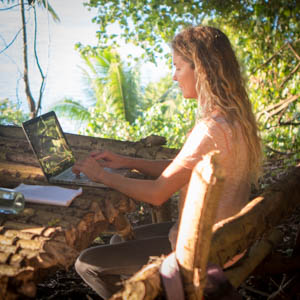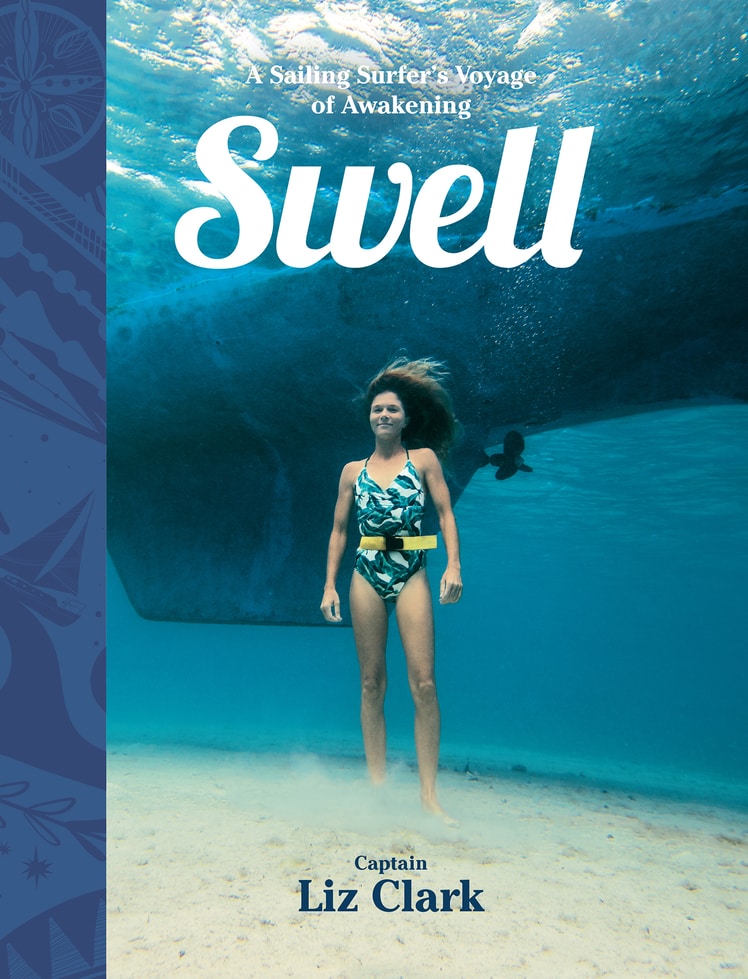From Love to Action, Saving Oceania: Interview by Founders of 9 for 17

“Think occasionally of the suffering of which you spare yourself the sight.” – Albert Schweitzer. Photograph by Talitha Wisner
The above photo and quote were my introduction to Leah and Talitha Wisner. I stumbled upon their instagram account last year and was moved to contact them. Their research proved that 9 of the UN’s 17 Global Goals for Sustainable Development could be met by one person going vegan (living a plant-based lifestyle). They had started a grassroots organization to help spread awareness and provide organic fruits and vegetables to the parts of their community in need. Leah, is a graduate student studying Nutrition and Food Systems and Talitha, a freshman at Princeton University, is studying diplomacy. These bright young ladies make me hopeful for the future. Recently, they interviewed me for their column in “Rio Magazine”, published in Nuevo Laredo, Tamaulipas. I decided to share it with you here.
But first, a quote by Leah …
“An infallible truth hides behind every modern civilization, shielded by the graceful distance of miles. The livestock industry has fought to conceal the cesspools of poison draining their feedlots, yet the degradative effects of its unethical conduct have become increasingly apparent. Recently, in Livestock’s Long Shadow, a report by the United Nations, revealed animal agriculture is “among the top two or three most significant contributors to our environmental problems, at every scale, local to global.” Considering world population is projected to reach 9.1 billion by 2050 and animal products are expected to double, the U.N.’s report essentially renders a dietary preference for animal products unsustainable, a dramatic dietary switch to a plant-based lifestyle necessary, and a definite reckoning between these two forces inevitable.” –Leah Wisner
Interview by Leah and Talitha Wisner, Founders of 9 for 17.
- Liz, your love of surfing led you to sailing the Pacific and now to grassroots activism. What experiences in Oceania led to your work with grassroots organizations focused on diet and sustainable development?”
As exciting as it is to sail to new destinations, my voyage has also led me to some sobering moments seeing adverse human impacts on the planet firsthand. I deal with the world’s plastic pollution problem on a daily basis, observe fishery declines, and have many indigenous friends in the Pacific that stand to be displaced by rising sea levels. As I fell deeper in love with the mystery and magic that is our Mother Earth, I was seeing small environmental crises happening everywhere I sailed. I battled ear infections and mercury poisoning from surfing in and eating fish from polluted waters in Central America. I witness seabirds wrapped in fishing line, corals suffocated by runoff and development, sharks killed for their fins, fish being trapped for aquariums. I’ve had opportunities to see extraordinary ocean ecosystems and creatures, but at the same time I’ve developed a sense of their vulnerability. It’s a strange feeling to sail through a chain of islands that could be completely underwater due to climate change in less than a hundred years. I started making changes in my own life in hopes of treading lighter on the planet. And encouraging others to do the same. I can’t sit by and let our modern systems destroy the things I love.
2. Foreign Affairs recently published “Sinking States, Climate Change and the Next Refugee Crisis”, an article about how Scientists expect Tuvalu to disappear in the next 50 years, and the Maldives in the next 30. Once they become uninhabitable, neighboring islands will follow, affecting up to 9.2 million people throughout the Pacific Ocean’s 22 island states and 345,000 in the Maldives. You currently reside in the French Polynesia; how does this make you feel?
Sad. These people will lose everything. I remember talking to a Puamotu couple one day. The man picked up handful of dirt and sand and said “This island is my pito. I am nothing without it.” Pito is their word for bellybutton. His wife continued, “When the coconut trees go, we will have to go too.” The conversation had come up because I asked why some of the coconut palms were dead. They said they had died because the rising seas had made it too salty for the trees to grow. It hurts to think that these islanders who live so lightly on the planet, will be some of the most heavily impacted.

Where will my little friends go? Climate change threatens to displace thousands of people on low-lying islands. Photo from 2007.
3. What particular experiences led you to becoming vegan?
As a solo sailor, freedom is something I’ve come to believe is necessary for every soul. One day I came across a young boar on an island being raised for meat. It was in a tiny dirty pen, skinny, hungry, alone, and obviously suffering. I couldn’t do anything at the time to help it, and I decided that day that I couldn’t continue to consume animals raised in captivity, including dairy products. I had to educate myself to eat ‘vegan’ properly, but it felt really good to follow through with my ethics, plus I couldn’t believe the health benefits I experienced. The more I researched the environmental impacts of animal agriculture, the more convinced I became that it was the right decision for me. Although I personally have less problems with eating wild meats, I chose to stop fishing in places where I could eat plant-based due to visible declines in many of the fisheries where I was sailing. Now I prefer not to kill unless it’s necessary.
4. Talitha and I, two sisters from Laredo, Texas, wrote to you about the UN’s Global Goals for Sustainable Development and our research proving 9 of the 17 goals are met by eating less animal products and more fruits and vegetables. Why write back? Why invite us to Patagonia’s Journeys to Activism event in California?
Because of how powerfully their research was presented. It’s a well formulated argument for something I believe in strongly, and I wanted to meet the young women who offered solutions to world problems at an age when I was completely selfish.
5. Malnutrition in all its forms affects almost one in three people on the planet. Obesity alone affects 600 million adults and 42 million children under five. “Business as usual”, especially in developed parts of the world, isn’t enough anymore. What can citizens do, individually and collectively, to promote Goal #3 Good Health and Well-Being?
GO VEGAN! Or start by at least becoming aware of your consumption of animal products. You might begin to cut them out occasionally–using whatever cause pulls hardest at your heart strings for motivation–animal welfare, personal health, or climate change and planetary health. Both my parents recently went vegan for health reasons, and experienced unbelievable positive changes in both cardio-vascular and digestive health after only a few months of eating vegan.

I’ve spent almost five years thriving on a plant-based diet! (*aside from very occasional selectively caught fish in appropriate locations. :)
6. Where does reverence for life meet public policy?
I’m hopeful that more widespread reverence for life will begin to reflect in public policy as people shift away from separatist thinking toward understanding our deep connection to other beings and the planet. For example, Goal #12 Responsible Consumption and Production is possible if children are taught to consume and produce sustainably. As “sustainble” becomes collectively agreed upon as the only acceptable way, the technology will continue to arise. If collective change begins with individual action, then education is the single most important driver of sustainable solutions to global issues everywhere.
Although history indicates shifting society’s focus away from animal products will likely take generations, the Latin root of “community,” communis, means the ability “to change”. Transformation will begin at the grassroots level as the outcome of concerned citizens’ idealistic efforts. As creative minds converge, results will coalesce and positive progress will become inevitable.
The 9 Global Goals That Can Be Met by One Individual Going Vegan:
Zero Hunger
Good Health and Well-Being
Clean Water and Sanitation
Affordable and Clean Energy
Responsible Consumption and Production
Climate Action
Life Below Water
Life on Land
Partnerships for the Goals

The 9 of the UN’s 17 Global Goals for Sustainable Development that can be met by one person going vegan.
Read how 9 for 17 proof here! http://9for17.wixsite.com/9for17/goals and the UN’s Sustainable Development Goals and Livestock’s Long Shadow Report . Check them out on Instagram at @9for17.







4 Comments
Waid Lackey
February 28, 2017I have been vegan for 2 years. I abstain from all animal products. It has been one of the best decisions of my 52 years. I wish I had been awakened long ago, and it still makes my heart ache to think about how many animals suffered to feed my unquestioning sense that I needed animal products to exist. Everything deserves freedom. However, we are asleep until something awakens us. I am so very thankful when I read or hear of others in this world trying their best to make a difference for all beings. Thank you Liz, Leah, Talitha, and others. May blessings follow you all.
Amber
March 11, 2017I love ready about your adventures. Just wish you would blog more often. We have a 35 foot sailbook and sail around the golf islands along Vancouver Island and the mainland during the warmer months. What a wonderful life. Gentle Breezes.
Geoff McAndrews
March 21, 2017Hi Liz,
I opened a surf camp on Tautsina Island, Bougainville PNG. This is a new zone that has seen no surf media yet. Bougainville went through a civil war and we are trying to bring surf tourism to the island. You want to see a good sustainability film search “The Coconut Revolution” on YouTube. If you want to come check this place out let me know. I am trying to pitch the (surf trip) idea to Patagonia but I don’t really have any contacts there. I will be going back in November. I’m in Jackson Hole right now. Thinking about visiting Lutz on my way there. I still have 2 boards at his house. I need help getting this surf camp off the ground. We have one bungalow set up and 4 groups have come so far. All the bookings scored good waves.
Captain Liz
April 20, 2017Rad Geoff! I would love to come visit! I’ve seen Coconut Revolution and I loved it!!